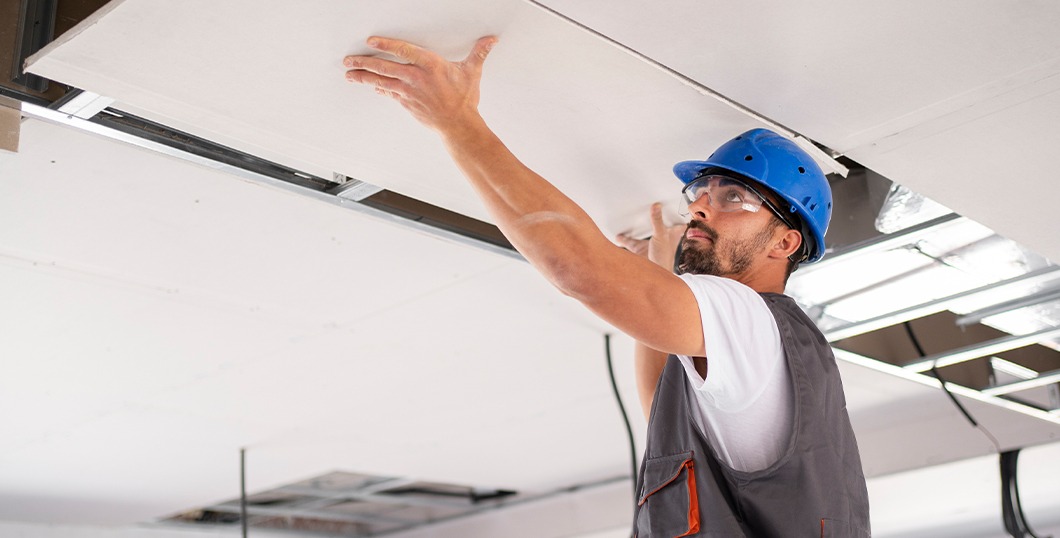
In the intricate bricks, beams, and blueprints that are in the construction industry, the gypsum board emerges as a silent maestro, weaving together structural integrity, aesthetic finesse, and practical functionality. Commonly recognized as drywall or plasterboard, gypsum board has evolved into a cornerstone of modern construction projects. Its unassuming presence belies its indispensable role, as it contributes to the stability, safety, and versatility of structures. From providing a canvas for design innovation to ensuring fire resistance and sound insulation, gypsum board stands as a testament to the synergy between form and function in the dynamic world of construction.
What is Gypsum in construction?
Gypsum is a naturally emerging mineral composed of calcium sulfate dehydrate. Gypsum has the chemical formula CaSO4 2H2O, meaning it’s made up of calcium, sulphur, oxygen, and water. It is widely utilized in the construction industry for its versatile properties, and there are different types of gypsum products used in various construction applications. Gypsum is highly beneficial in our modern society, but it has its most significant uses in construction, where its properties, such as structural support, sound insulation, and fire resistance, have increased the safety and efficiency of construction projects.
Some of the essential purposes of gypsum in construction are:
Structural Integrity and Support
Gypsum plays an essential role in providing structural integrity and support in construction projects. The inherent strength of gypsum, combined with its lightweight composition, makes it an ideal material for creating strong yet manageable building elements. Whether used in the form of solid gypsum blocks for load-bearing walls or as a core material in gypsum boards, its structural properties ensure that buildings maintain their stability over time. The reliable support offered by gypsum is a testament to its essential contribution to the strength and integrity of modern construction projects.
Fire Resistance
Gypsum is in the construction industry for its exceptional fire-resistant properties, when used in materials such as gypsum boards, the mineral core effectively inhibits the spread of flames, providing a vital layer of protection in buildings. This fire resistance is attributed to the water content within gypsum crystals, which is released as steam when exposed to high temperatures, thus retarding the progress of the fire. This inherent fire resistance has made gypsum-based materials a staple in building codes and regulations, highlighting their vital role in creating safer environments within residential, commercial, and industrial constructions.
Sound Insulation
Gypsum’s thick composition and unique physical properties make it an effective barrier against the transmission of sound. The inherent mass and thickness of gypsum contribute to minimizing sound vibrations, ensuring a quieter and more acoustically controlled environment. Gypsum boards, commonly used in interior walls, ceilings, and partitions, play a critical role in reducing airborne noise between rooms. This sound insulation capability is particularly essential in residential buildings, commercial spaces, and educational institutions where privacy and reduced ambient noise are essential considerations. By integrating gypsum-based materials, construction projects can achieve enhanced acoustic comfort, providing occupants with a more peaceful and conducive indoor atmosphere.
Smooth Surface for Finishes
Gypsum’s contribution to construction extends beyond its structural and fire-resistant qualities it also plays a key role in providing a smooth surface for finishes. This feature simplifies the finishing process while also enhancing the overall visual appeal of interior spaces. Whether creating a newly painted wall or applying intricate wall coverings, the smooth surface provided by Largest Gypsum Board Manufacturer In Oman serves as the foundation for achieving a polished and refined look in modern construction and interior design. Gypsum boards, with their flat and even surface, offer an ideal canvas for a variety of finishes such as paint, wallpaper, or textured coatings. The inherent smoothness of gypsum allows for seamless application, ensuring that the final aesthetic touches stick flawlessly.
Moisture Resistance
Gypsum boards with specialized moisture-resistant properties are designed to resist damp conditions, making them ideal for application in areas like bathrooms, kitchens, and basements. Gypsum’s versatility in construction extends to its ability to offer moisture resistance, a critical feature in environments prone to humidity and water exposure. These boards are engineered with additives that enhance their resistance to water, preventing damage caused by moisture absorption. By effectively repelling water, moisture-resistant gypsum boards contribute to the longevity and durability of interior structures, ensuring that walls and ceilings maintain their integrity even in environments where humidity and occasional water exposure are prevalent. This quality makes gypsum a valuable material in constructing spaces that demand both aesthetic appeal and resilience in the face of moisture challenges.
From supporting structures to providing a canvas for artistic expression, the gypsum board’s role in construction projects is far-reaching and transformative, shaping the spaces where we live, work, and thrive. Global Gypsum Boards stands as a prominent among Gypsum Board Manufacturers and Suppliers, in Oman; we have emerged as a reliable source for top-notch gypsum board solutions in the construction industry. Global Gypsum Board’s presence is synonymous with excellence, offering a diverse range of gypsum boards that cater to the varied needs of construction projects. Our company’s commitment to customer satisfaction, combined with its emphasis on innovation, solidifies its standing as a key player in the gypsum board manufacturing industry in Oman.




